Ethics and Standards of Conduct for Nurses: A Detailed Report
VerifiedAdded on 2023/01/18
|10
|2066
|76
Report
AI Summary
This report, titled "Ethics and Standard of Conduct for Nurses," delves into the critical aspects of ethical nursing practice. Part A outlines the five key components of a well-functioning health system according to the World Health Organization and differentiates between macro and micro approaches to health. Part B focuses on the ethical principles in nursing, including justice, nonmaleficence, beneficence, fidelity, accountability, and veracity. It presents a case study involving Nurse RN Becky, who faces an ethical dilemma when a patient's family member attempts to administer Chinese medicine. The report analyzes the ethical issues at play, such as accountability, beneficence, justice, and nonmaleficence, and discusses the decisions Becky should make, emphasizing the potential consequences of negligence and the importance of adhering to ethical guidelines. The conclusion reiterates the significance of ethical conduct in preventing malpractice and ensuring patient safety, referencing relevant literature and real-world examples.
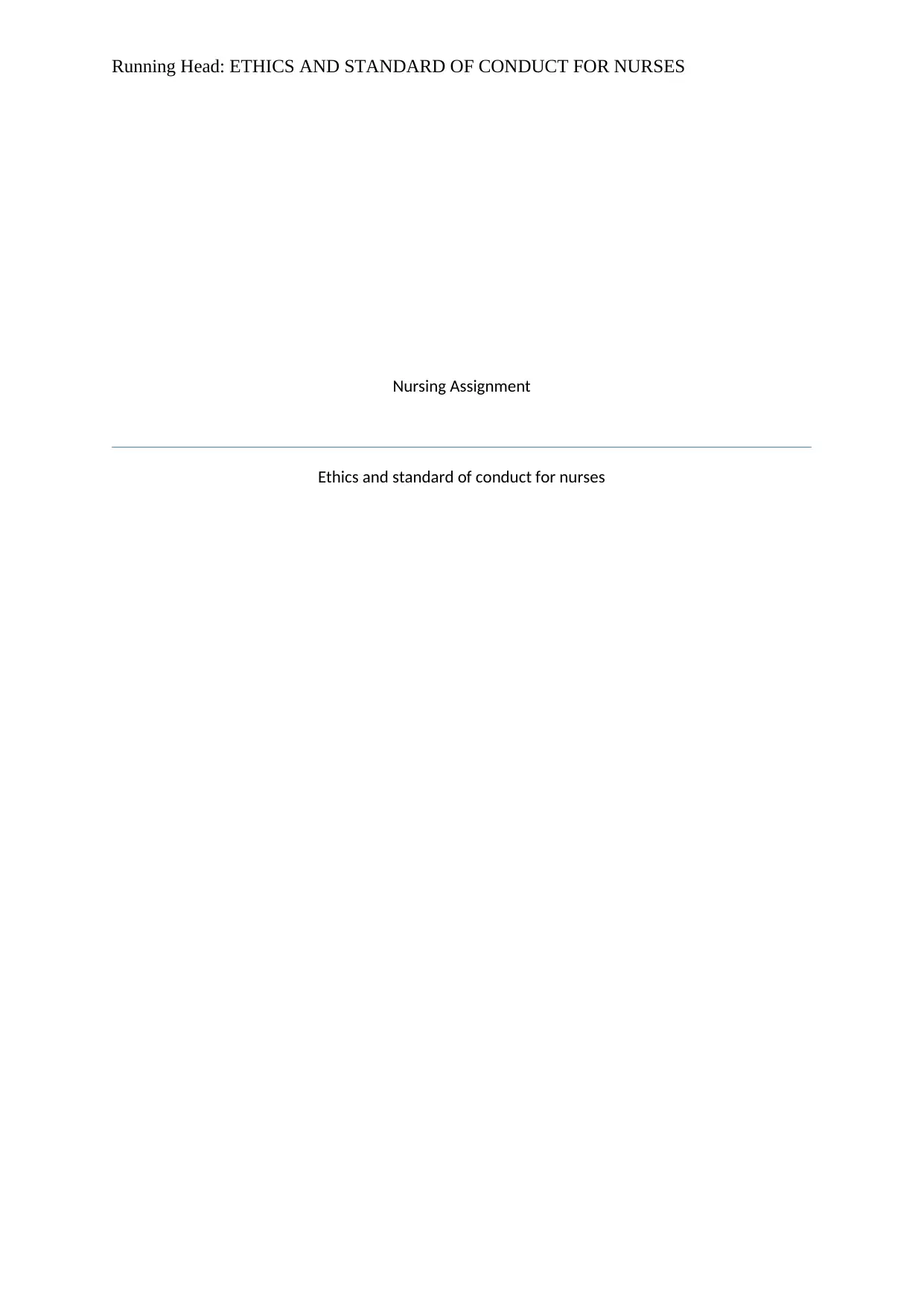
Running Head: ETHICS AND STANDARD OF CONDUCT FOR NURSES
Nursing Assignment
Ethics and standard of conduct for nurses
Nursing Assignment
Ethics and standard of conduct for nurses
Paraphrase This Document
Need a fresh take? Get an instant paraphrase of this document with our AI Paraphraser
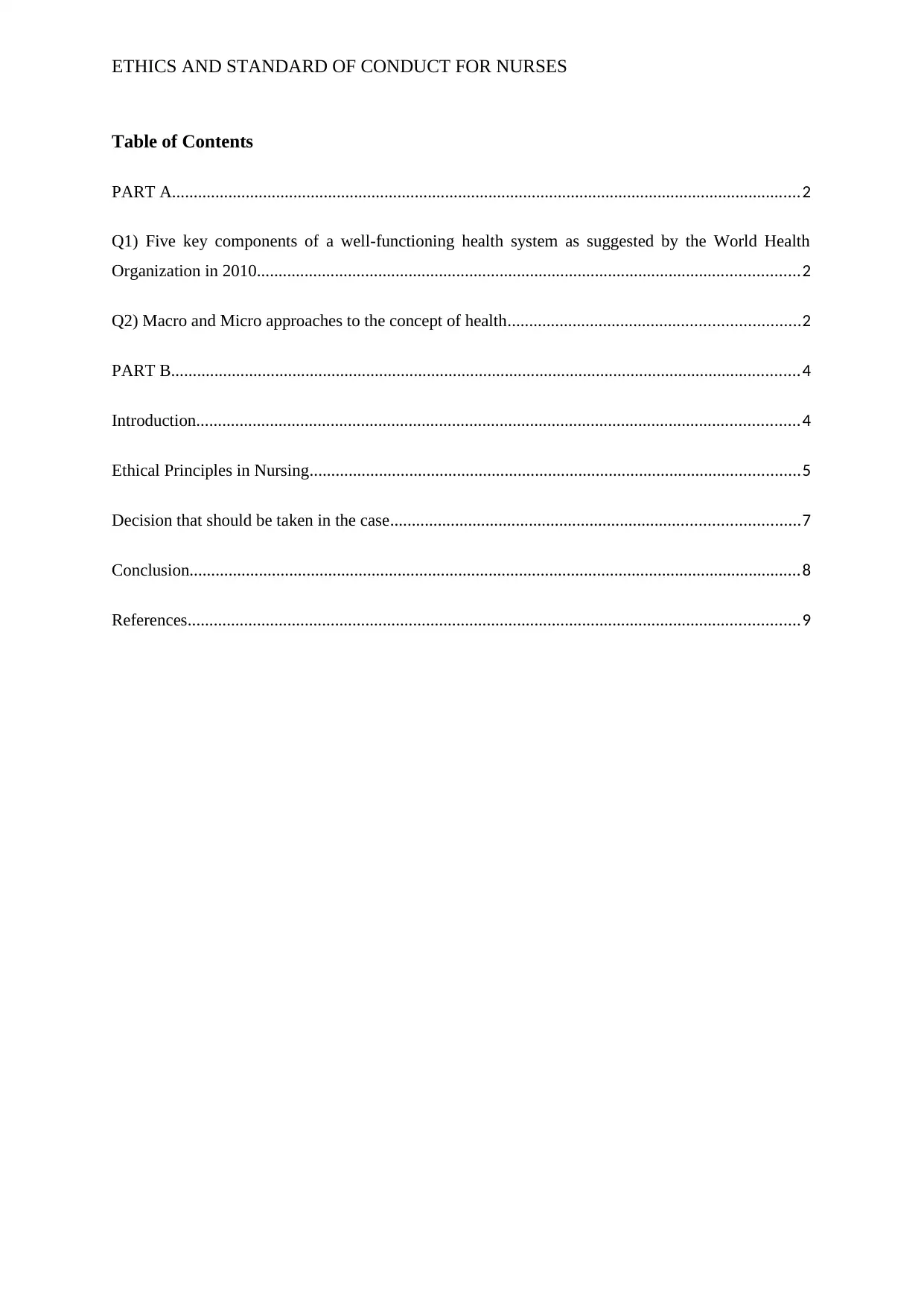
ETHICS AND STANDARD OF CONDUCT FOR NURSES
Table of Contents
PART A.................................................................................................................................................2
Q1) Five key components of a well-functioning health system as suggested by the World Health
Organization in 2010.............................................................................................................................2
Q2) Macro and Micro approaches to the concept of health...................................................................2
PART B.................................................................................................................................................4
Introduction...........................................................................................................................................4
Ethical Principles in Nursing.................................................................................................................5
Decision that should be taken in the case..............................................................................................7
Conclusion.............................................................................................................................................8
References.............................................................................................................................................9
Table of Contents
PART A.................................................................................................................................................2
Q1) Five key components of a well-functioning health system as suggested by the World Health
Organization in 2010.............................................................................................................................2
Q2) Macro and Micro approaches to the concept of health...................................................................2
PART B.................................................................................................................................................4
Introduction...........................................................................................................................................4
Ethical Principles in Nursing.................................................................................................................5
Decision that should be taken in the case..............................................................................................7
Conclusion.............................................................................................................................................8
References.............................................................................................................................................9
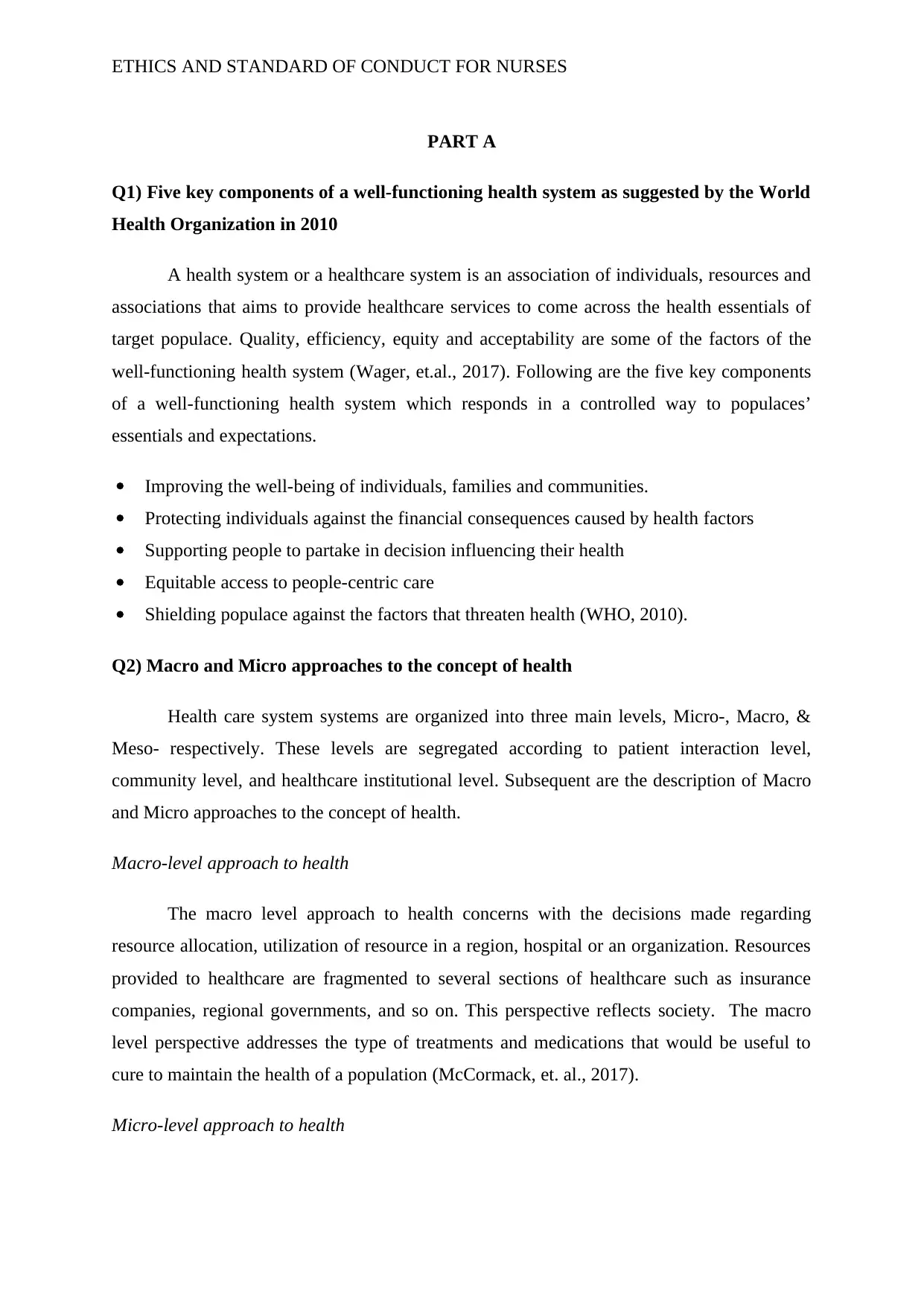
ETHICS AND STANDARD OF CONDUCT FOR NURSES
PART A
Q1) Five key components of a well-functioning health system as suggested by the World
Health Organization in 2010
A health system or a healthcare system is an association of individuals, resources and
associations that aims to provide healthcare services to come across the health essentials of
target populace. Quality, efficiency, equity and acceptability are some of the factors of the
well-functioning health system (Wager, et.al., 2017). Following are the five key components
of a well-functioning health system which responds in a controlled way to populaces’
essentials and expectations.
Improving the well-being of individuals, families and communities.
Protecting individuals against the financial consequences caused by health factors
Supporting people to partake in decision influencing their health
Equitable access to people-centric care
Shielding populace against the factors that threaten health (WHO, 2010).
Q2) Macro and Micro approaches to the concept of health
Health care system systems are organized into three main levels, Micro-, Macro, &
Meso- respectively. These levels are segregated according to patient interaction level,
community level, and healthcare institutional level. Subsequent are the description of Macro
and Micro approaches to the concept of health.
Macro-level approach to health
The macro level approach to health concerns with the decisions made regarding
resource allocation, utilization of resource in a region, hospital or an organization. Resources
provided to healthcare are fragmented to several sections of healthcare such as insurance
companies, regional governments, and so on. This perspective reflects society. The macro
level perspective addresses the type of treatments and medications that would be useful to
cure to maintain the health of a population (McCormack, et. al., 2017).
Micro-level approach to health
PART A
Q1) Five key components of a well-functioning health system as suggested by the World
Health Organization in 2010
A health system or a healthcare system is an association of individuals, resources and
associations that aims to provide healthcare services to come across the health essentials of
target populace. Quality, efficiency, equity and acceptability are some of the factors of the
well-functioning health system (Wager, et.al., 2017). Following are the five key components
of a well-functioning health system which responds in a controlled way to populaces’
essentials and expectations.
Improving the well-being of individuals, families and communities.
Protecting individuals against the financial consequences caused by health factors
Supporting people to partake in decision influencing their health
Equitable access to people-centric care
Shielding populace against the factors that threaten health (WHO, 2010).
Q2) Macro and Micro approaches to the concept of health
Health care system systems are organized into three main levels, Micro-, Macro, &
Meso- respectively. These levels are segregated according to patient interaction level,
community level, and healthcare institutional level. Subsequent are the description of Macro
and Micro approaches to the concept of health.
Macro-level approach to health
The macro level approach to health concerns with the decisions made regarding
resource allocation, utilization of resource in a region, hospital or an organization. Resources
provided to healthcare are fragmented to several sections of healthcare such as insurance
companies, regional governments, and so on. This perspective reflects society. The macro
level perspective addresses the type of treatments and medications that would be useful to
cure to maintain the health of a population (McCormack, et. al., 2017).
Micro-level approach to health
⊘ This is a preview!⊘
Do you want full access?
Subscribe today to unlock all pages.

Trusted by 1+ million students worldwide
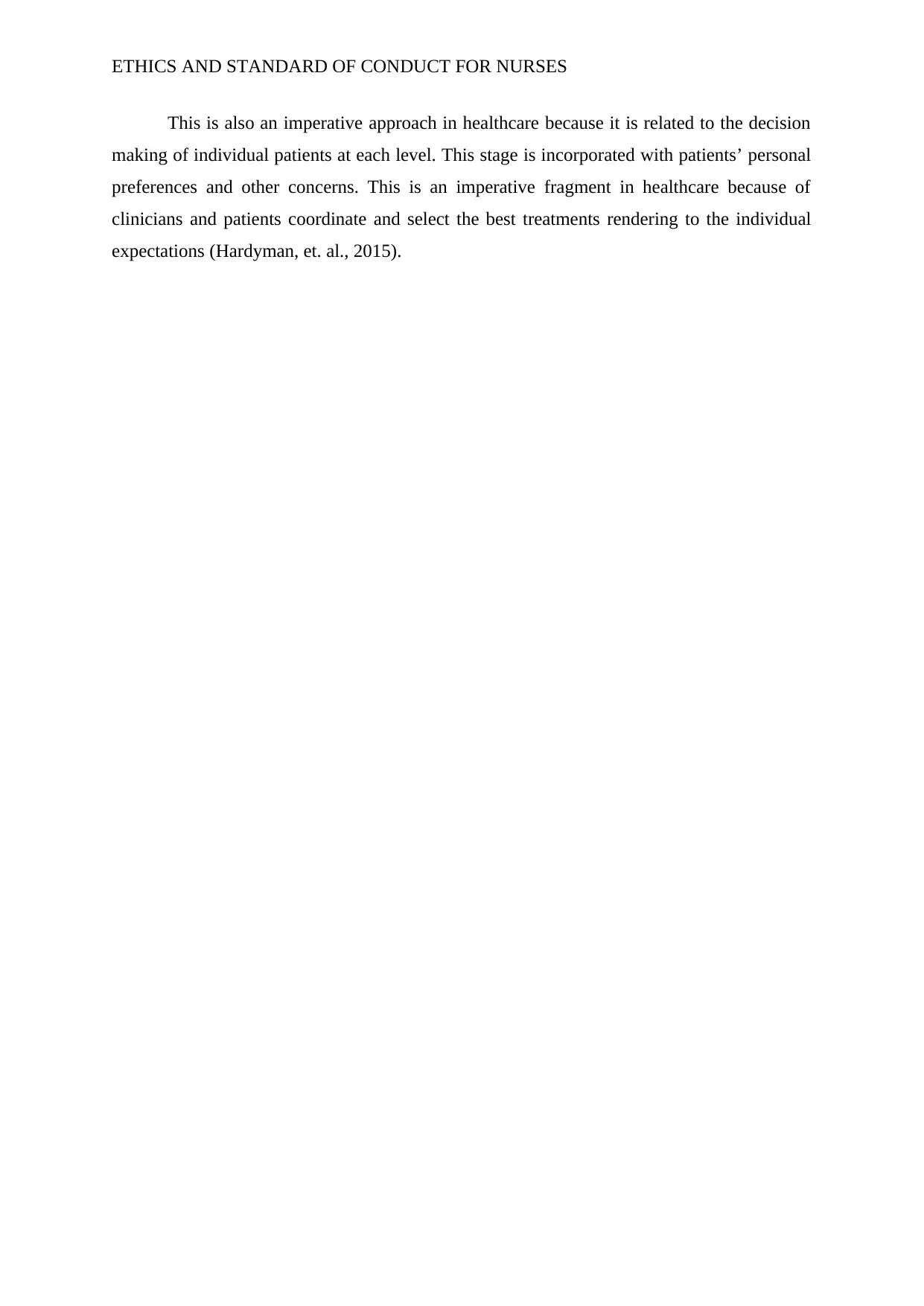
ETHICS AND STANDARD OF CONDUCT FOR NURSES
This is also an imperative approach in healthcare because it is related to the decision
making of individual patients at each level. This stage is incorporated with patients’ personal
preferences and other concerns. This is an imperative fragment in healthcare because of
clinicians and patients coordinate and select the best treatments rendering to the individual
expectations (Hardyman, et. al., 2015).
This is also an imperative approach in healthcare because it is related to the decision
making of individual patients at each level. This stage is incorporated with patients’ personal
preferences and other concerns. This is an imperative fragment in healthcare because of
clinicians and patients coordinate and select the best treatments rendering to the individual
expectations (Hardyman, et. al., 2015).
Paraphrase This Document
Need a fresh take? Get an instant paraphrase of this document with our AI Paraphraser
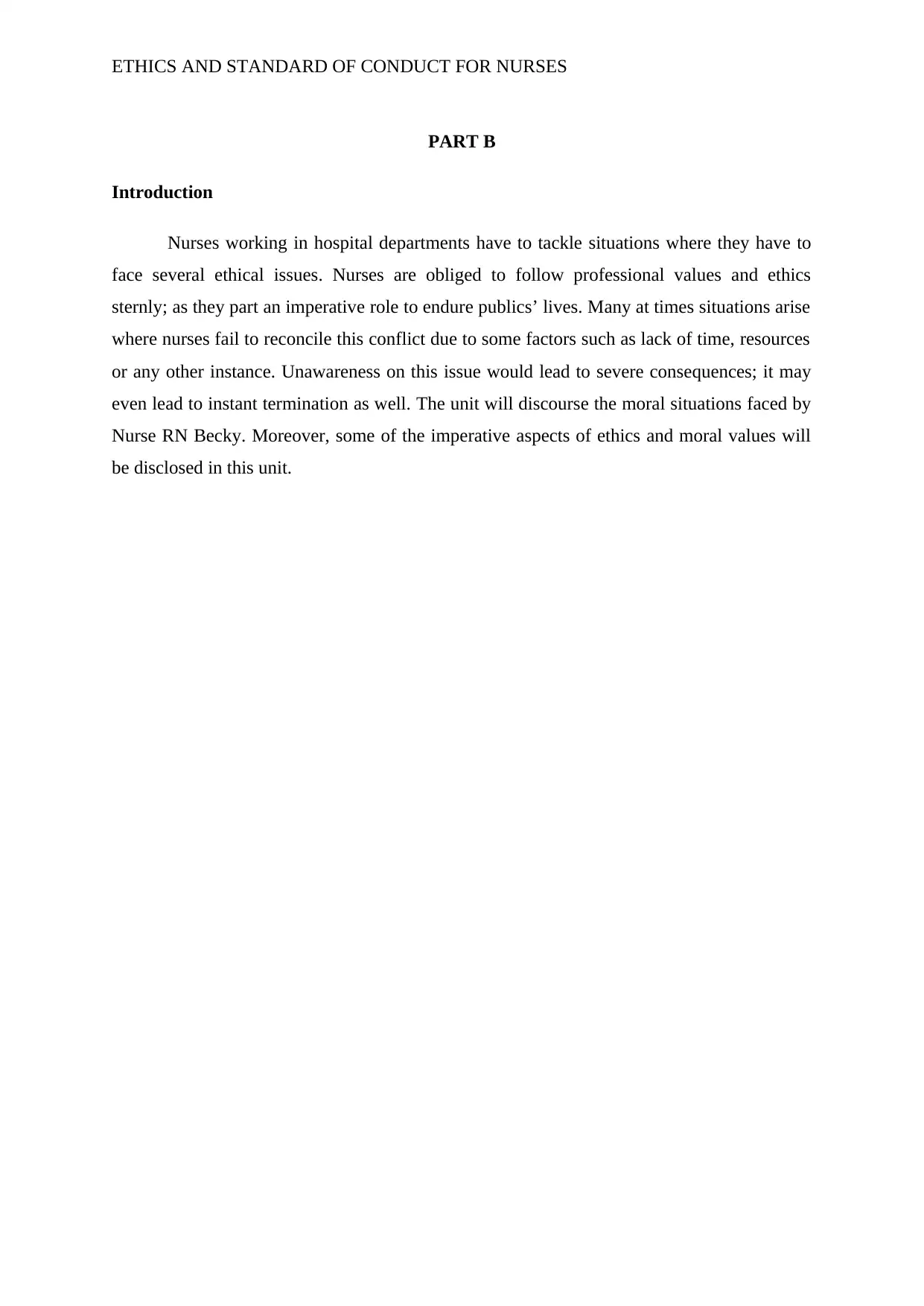
ETHICS AND STANDARD OF CONDUCT FOR NURSES
PART B
Introduction
Nurses working in hospital departments have to tackle situations where they have to
face several ethical issues. Nurses are obliged to follow professional values and ethics
sternly; as they part an imperative role to endure publics’ lives. Many at times situations arise
where nurses fail to reconcile this conflict due to some factors such as lack of time, resources
or any other instance. Unawareness on this issue would lead to severe consequences; it may
even lead to instant termination as well. The unit will discourse the moral situations faced by
Nurse RN Becky. Moreover, some of the imperative aspects of ethics and moral values will
be disclosed in this unit.
PART B
Introduction
Nurses working in hospital departments have to tackle situations where they have to
face several ethical issues. Nurses are obliged to follow professional values and ethics
sternly; as they part an imperative role to endure publics’ lives. Many at times situations arise
where nurses fail to reconcile this conflict due to some factors such as lack of time, resources
or any other instance. Unawareness on this issue would lead to severe consequences; it may
even lead to instant termination as well. The unit will discourse the moral situations faced by
Nurse RN Becky. Moreover, some of the imperative aspects of ethics and moral values will
be disclosed in this unit.
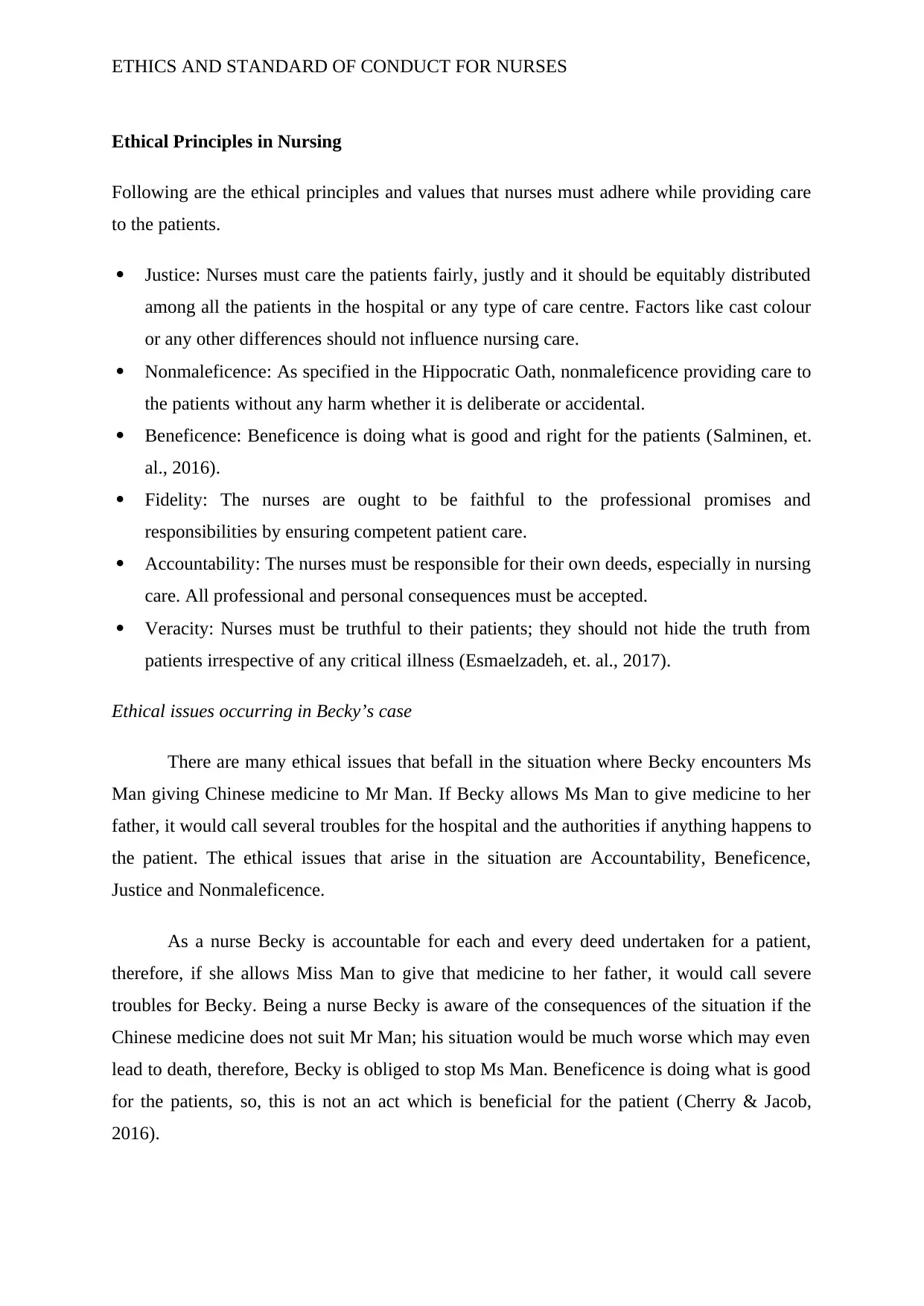
ETHICS AND STANDARD OF CONDUCT FOR NURSES
Ethical Principles in Nursing
Following are the ethical principles and values that nurses must adhere while providing care
to the patients.
Justice: Nurses must care the patients fairly, justly and it should be equitably distributed
among all the patients in the hospital or any type of care centre. Factors like cast colour
or any other differences should not influence nursing care.
Nonmaleficence: As specified in the Hippocratic Oath, nonmaleficence providing care to
the patients without any harm whether it is deliberate or accidental.
Beneficence: Beneficence is doing what is good and right for the patients (Salminen, et.
al., 2016).
Fidelity: The nurses are ought to be faithful to the professional promises and
responsibilities by ensuring competent patient care.
Accountability: The nurses must be responsible for their own deeds, especially in nursing
care. All professional and personal consequences must be accepted.
Veracity: Nurses must be truthful to their patients; they should not hide the truth from
patients irrespective of any critical illness (Esmaelzadeh, et. al., 2017).
Ethical issues occurring in Becky’s case
There are many ethical issues that befall in the situation where Becky encounters Ms
Man giving Chinese medicine to Mr Man. If Becky allows Ms Man to give medicine to her
father, it would call several troubles for the hospital and the authorities if anything happens to
the patient. The ethical issues that arise in the situation are Accountability, Beneficence,
Justice and Nonmaleficence.
As a nurse Becky is accountable for each and every deed undertaken for a patient,
therefore, if she allows Miss Man to give that medicine to her father, it would call severe
troubles for Becky. Being a nurse Becky is aware of the consequences of the situation if the
Chinese medicine does not suit Mr Man; his situation would be much worse which may even
lead to death, therefore, Becky is obliged to stop Ms Man. Beneficence is doing what is good
for the patients, so, this is not an act which is beneficial for the patient (Cherry & Jacob,
2016).
Ethical Principles in Nursing
Following are the ethical principles and values that nurses must adhere while providing care
to the patients.
Justice: Nurses must care the patients fairly, justly and it should be equitably distributed
among all the patients in the hospital or any type of care centre. Factors like cast colour
or any other differences should not influence nursing care.
Nonmaleficence: As specified in the Hippocratic Oath, nonmaleficence providing care to
the patients without any harm whether it is deliberate or accidental.
Beneficence: Beneficence is doing what is good and right for the patients (Salminen, et.
al., 2016).
Fidelity: The nurses are ought to be faithful to the professional promises and
responsibilities by ensuring competent patient care.
Accountability: The nurses must be responsible for their own deeds, especially in nursing
care. All professional and personal consequences must be accepted.
Veracity: Nurses must be truthful to their patients; they should not hide the truth from
patients irrespective of any critical illness (Esmaelzadeh, et. al., 2017).
Ethical issues occurring in Becky’s case
There are many ethical issues that befall in the situation where Becky encounters Ms
Man giving Chinese medicine to Mr Man. If Becky allows Ms Man to give medicine to her
father, it would call several troubles for the hospital and the authorities if anything happens to
the patient. The ethical issues that arise in the situation are Accountability, Beneficence,
Justice and Nonmaleficence.
As a nurse Becky is accountable for each and every deed undertaken for a patient,
therefore, if she allows Miss Man to give that medicine to her father, it would call severe
troubles for Becky. Being a nurse Becky is aware of the consequences of the situation if the
Chinese medicine does not suit Mr Man; his situation would be much worse which may even
lead to death, therefore, Becky is obliged to stop Ms Man. Beneficence is doing what is good
for the patients, so, this is not an act which is beneficial for the patient (Cherry & Jacob,
2016).
⊘ This is a preview!⊘
Do you want full access?
Subscribe today to unlock all pages.

Trusted by 1+ million students worldwide
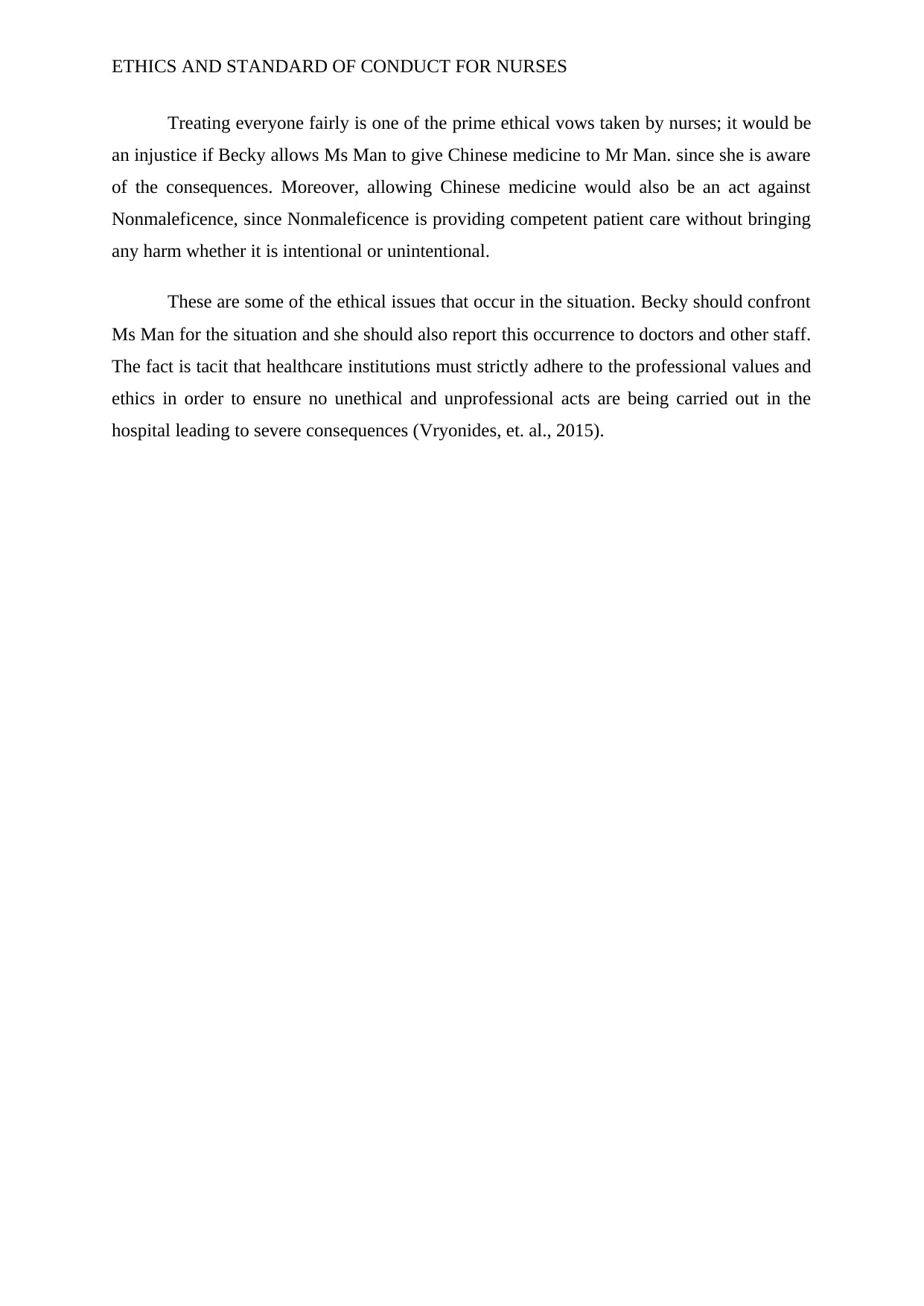
ETHICS AND STANDARD OF CONDUCT FOR NURSES
Treating everyone fairly is one of the prime ethical vows taken by nurses; it would be
an injustice if Becky allows Ms Man to give Chinese medicine to Mr Man. since she is aware
of the consequences. Moreover, allowing Chinese medicine would also be an act against
Nonmaleficence, since Nonmaleficence is providing competent patient care without bringing
any harm whether it is intentional or unintentional.
These are some of the ethical issues that occur in the situation. Becky should confront
Ms Man for the situation and she should also report this occurrence to doctors and other staff.
The fact is tacit that healthcare institutions must strictly adhere to the professional values and
ethics in order to ensure no unethical and unprofessional acts are being carried out in the
hospital leading to severe consequences (Vryonides, et. al., 2015).
Treating everyone fairly is one of the prime ethical vows taken by nurses; it would be
an injustice if Becky allows Ms Man to give Chinese medicine to Mr Man. since she is aware
of the consequences. Moreover, allowing Chinese medicine would also be an act against
Nonmaleficence, since Nonmaleficence is providing competent patient care without bringing
any harm whether it is intentional or unintentional.
These are some of the ethical issues that occur in the situation. Becky should confront
Ms Man for the situation and she should also report this occurrence to doctors and other staff.
The fact is tacit that healthcare institutions must strictly adhere to the professional values and
ethics in order to ensure no unethical and unprofessional acts are being carried out in the
hospital leading to severe consequences (Vryonides, et. al., 2015).
Paraphrase This Document
Need a fresh take? Get an instant paraphrase of this document with our AI Paraphraser
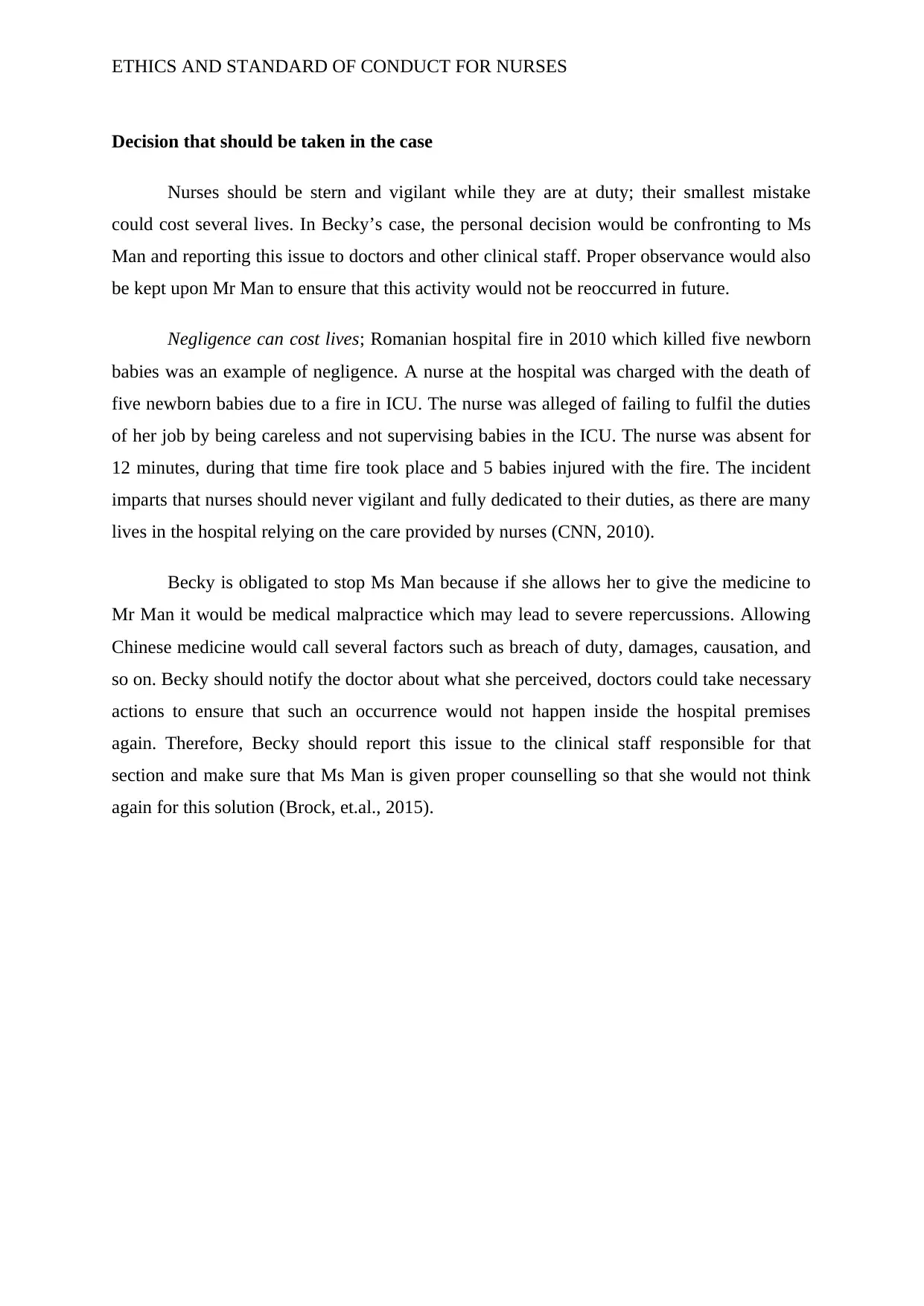
ETHICS AND STANDARD OF CONDUCT FOR NURSES
Decision that should be taken in the case
Nurses should be stern and vigilant while they are at duty; their smallest mistake
could cost several lives. In Becky’s case, the personal decision would be confronting to Ms
Man and reporting this issue to doctors and other clinical staff. Proper observance would also
be kept upon Mr Man to ensure that this activity would not be reoccurred in future.
Negligence can cost lives; Romanian hospital fire in 2010 which killed five newborn
babies was an example of negligence. A nurse at the hospital was charged with the death of
five newborn babies due to a fire in ICU. The nurse was alleged of failing to fulfil the duties
of her job by being careless and not supervising babies in the ICU. The nurse was absent for
12 minutes, during that time fire took place and 5 babies injured with the fire. The incident
imparts that nurses should never vigilant and fully dedicated to their duties, as there are many
lives in the hospital relying on the care provided by nurses (CNN, 2010).
Becky is obligated to stop Ms Man because if she allows her to give the medicine to
Mr Man it would be medical malpractice which may lead to severe repercussions. Allowing
Chinese medicine would call several factors such as breach of duty, damages, causation, and
so on. Becky should notify the doctor about what she perceived, doctors could take necessary
actions to ensure that such an occurrence would not happen inside the hospital premises
again. Therefore, Becky should report this issue to the clinical staff responsible for that
section and make sure that Ms Man is given proper counselling so that she would not think
again for this solution (Brock, et.al., 2015).
Decision that should be taken in the case
Nurses should be stern and vigilant while they are at duty; their smallest mistake
could cost several lives. In Becky’s case, the personal decision would be confronting to Ms
Man and reporting this issue to doctors and other clinical staff. Proper observance would also
be kept upon Mr Man to ensure that this activity would not be reoccurred in future.
Negligence can cost lives; Romanian hospital fire in 2010 which killed five newborn
babies was an example of negligence. A nurse at the hospital was charged with the death of
five newborn babies due to a fire in ICU. The nurse was alleged of failing to fulfil the duties
of her job by being careless and not supervising babies in the ICU. The nurse was absent for
12 minutes, during that time fire took place and 5 babies injured with the fire. The incident
imparts that nurses should never vigilant and fully dedicated to their duties, as there are many
lives in the hospital relying on the care provided by nurses (CNN, 2010).
Becky is obligated to stop Ms Man because if she allows her to give the medicine to
Mr Man it would be medical malpractice which may lead to severe repercussions. Allowing
Chinese medicine would call several factors such as breach of duty, damages, causation, and
so on. Becky should notify the doctor about what she perceived, doctors could take necessary
actions to ensure that such an occurrence would not happen inside the hospital premises
again. Therefore, Becky should report this issue to the clinical staff responsible for that
section and make sure that Ms Man is given proper counselling so that she would not think
again for this solution (Brock, et.al., 2015).
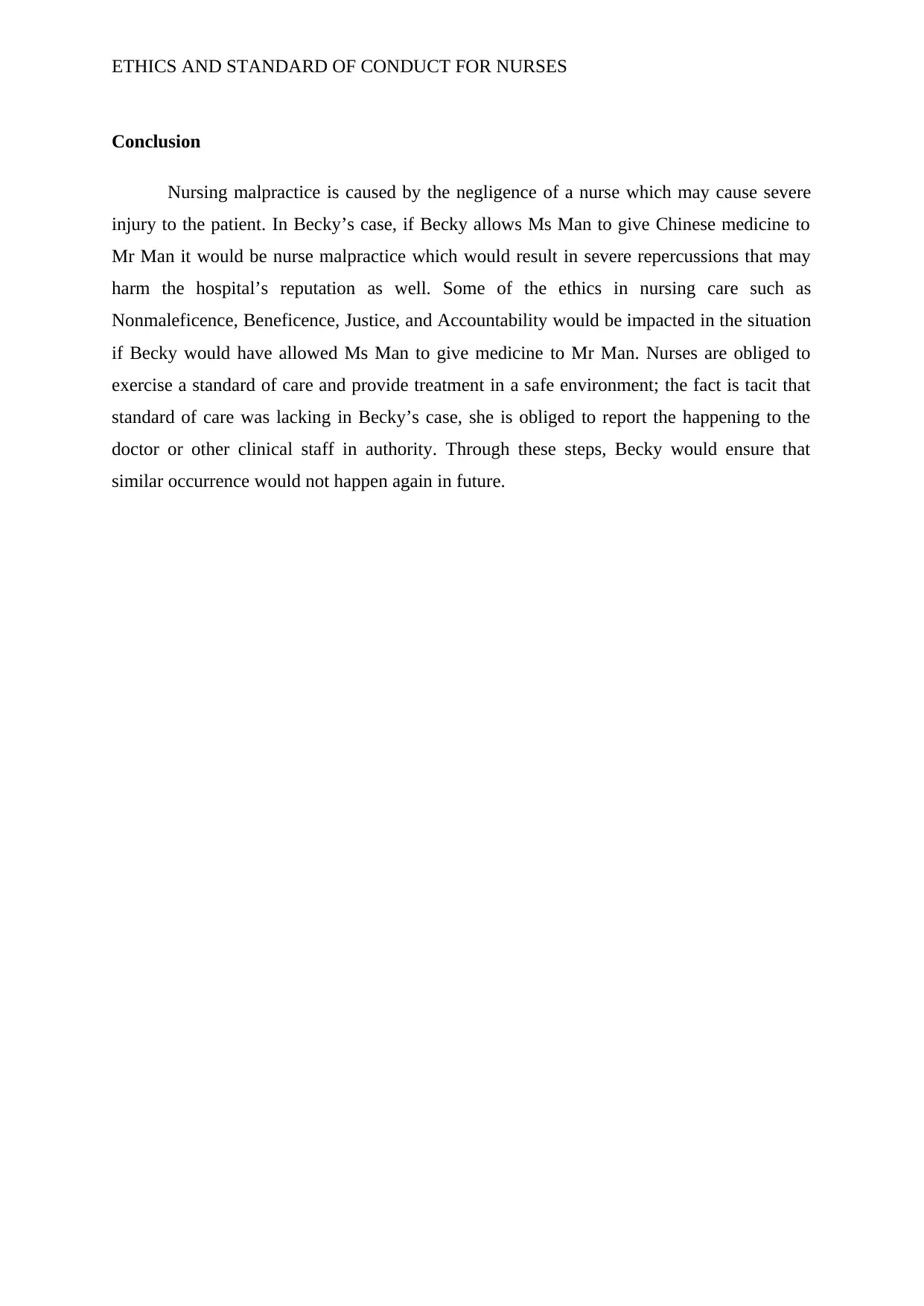
ETHICS AND STANDARD OF CONDUCT FOR NURSES
Conclusion
Nursing malpractice is caused by the negligence of a nurse which may cause severe
injury to the patient. In Becky’s case, if Becky allows Ms Man to give Chinese medicine to
Mr Man it would be nurse malpractice which would result in severe repercussions that may
harm the hospital’s reputation as well. Some of the ethics in nursing care such as
Nonmaleficence, Beneficence, Justice, and Accountability would be impacted in the situation
if Becky would have allowed Ms Man to give medicine to Mr Man. Nurses are obliged to
exercise a standard of care and provide treatment in a safe environment; the fact is tacit that
standard of care was lacking in Becky’s case, she is obliged to report the happening to the
doctor or other clinical staff in authority. Through these steps, Becky would ensure that
similar occurrence would not happen again in future.
Conclusion
Nursing malpractice is caused by the negligence of a nurse which may cause severe
injury to the patient. In Becky’s case, if Becky allows Ms Man to give Chinese medicine to
Mr Man it would be nurse malpractice which would result in severe repercussions that may
harm the hospital’s reputation as well. Some of the ethics in nursing care such as
Nonmaleficence, Beneficence, Justice, and Accountability would be impacted in the situation
if Becky would have allowed Ms Man to give medicine to Mr Man. Nurses are obliged to
exercise a standard of care and provide treatment in a safe environment; the fact is tacit that
standard of care was lacking in Becky’s case, she is obliged to report the happening to the
doctor or other clinical staff in authority. Through these steps, Becky would ensure that
similar occurrence would not happen again in future.
⊘ This is a preview!⊘
Do you want full access?
Subscribe today to unlock all pages.

Trusted by 1+ million students worldwide
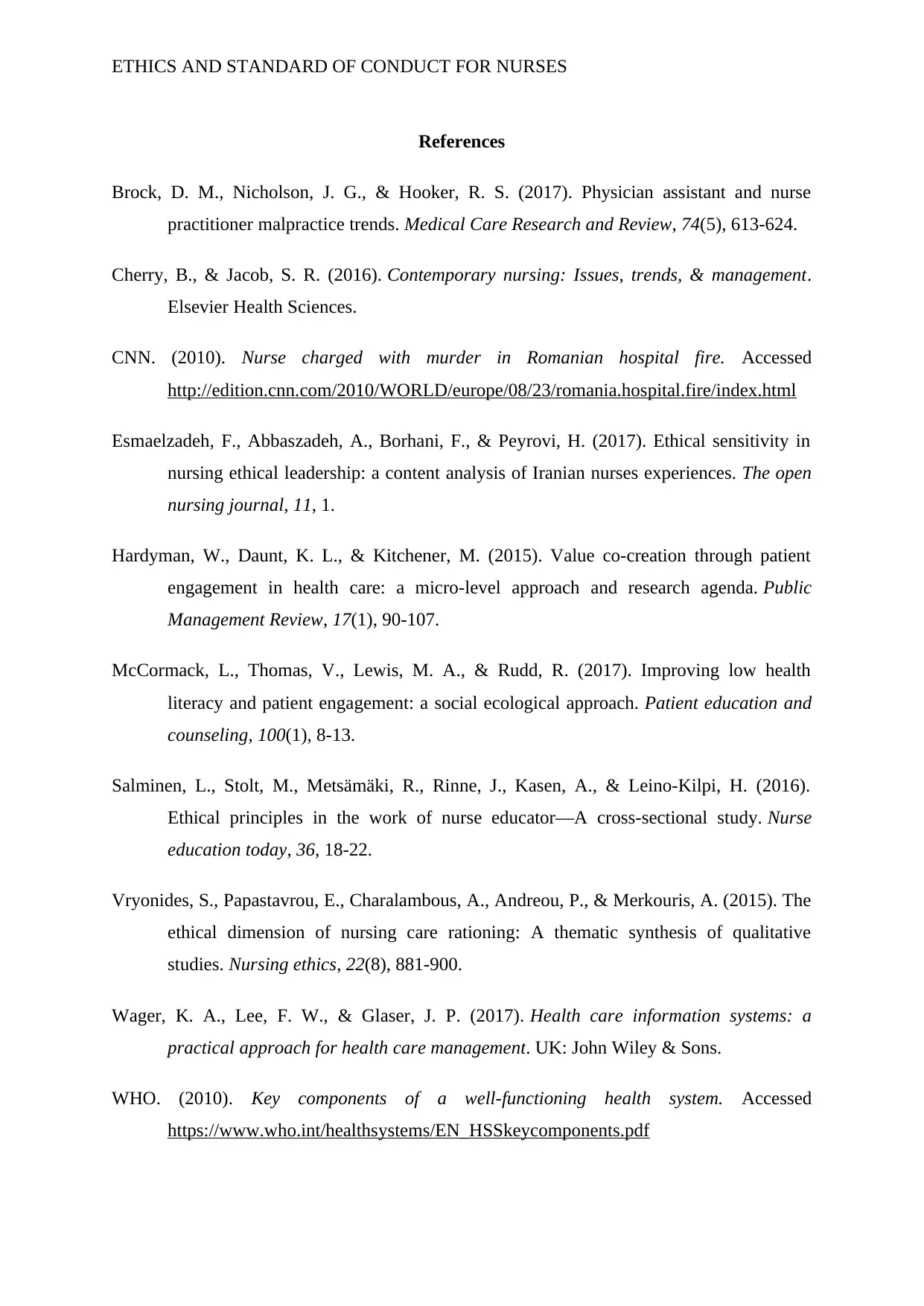
ETHICS AND STANDARD OF CONDUCT FOR NURSES
References
Brock, D. M., Nicholson, J. G., & Hooker, R. S. (2017). Physician assistant and nurse
practitioner malpractice trends. Medical Care Research and Review, 74(5), 613-624.
Cherry, B., & Jacob, S. R. (2016). Contemporary nursing: Issues, trends, & management.
Elsevier Health Sciences.
CNN. (2010). Nurse charged with murder in Romanian hospital fire. Accessed
http://edition.cnn.com/2010/WORLD/europe/08/23/romania.hospital.fire/index.html
Esmaelzadeh, F., Abbaszadeh, A., Borhani, F., & Peyrovi, H. (2017). Ethical sensitivity in
nursing ethical leadership: a content analysis of Iranian nurses experiences. The open
nursing journal, 11, 1.
Hardyman, W., Daunt, K. L., & Kitchener, M. (2015). Value co-creation through patient
engagement in health care: a micro-level approach and research agenda. Public
Management Review, 17(1), 90-107.
McCormack, L., Thomas, V., Lewis, M. A., & Rudd, R. (2017). Improving low health
literacy and patient engagement: a social ecological approach. Patient education and
counseling, 100(1), 8-13.
Salminen, L., Stolt, M., Metsämäki, R., Rinne, J., Kasen, A., & Leino-Kilpi, H. (2016).
Ethical principles in the work of nurse educator—A cross-sectional study. Nurse
education today, 36, 18-22.
Vryonides, S., Papastavrou, E., Charalambous, A., Andreou, P., & Merkouris, A. (2015). The
ethical dimension of nursing care rationing: A thematic synthesis of qualitative
studies. Nursing ethics, 22(8), 881-900.
Wager, K. A., Lee, F. W., & Glaser, J. P. (2017). Health care information systems: a
practical approach for health care management. UK: John Wiley & Sons.
WHO. (2010). Key components of a well-functioning health system. Accessed
https://www.who.int/healthsystems/EN_HSSkeycomponents.pdf
References
Brock, D. M., Nicholson, J. G., & Hooker, R. S. (2017). Physician assistant and nurse
practitioner malpractice trends. Medical Care Research and Review, 74(5), 613-624.
Cherry, B., & Jacob, S. R. (2016). Contemporary nursing: Issues, trends, & management.
Elsevier Health Sciences.
CNN. (2010). Nurse charged with murder in Romanian hospital fire. Accessed
http://edition.cnn.com/2010/WORLD/europe/08/23/romania.hospital.fire/index.html
Esmaelzadeh, F., Abbaszadeh, A., Borhani, F., & Peyrovi, H. (2017). Ethical sensitivity in
nursing ethical leadership: a content analysis of Iranian nurses experiences. The open
nursing journal, 11, 1.
Hardyman, W., Daunt, K. L., & Kitchener, M. (2015). Value co-creation through patient
engagement in health care: a micro-level approach and research agenda. Public
Management Review, 17(1), 90-107.
McCormack, L., Thomas, V., Lewis, M. A., & Rudd, R. (2017). Improving low health
literacy and patient engagement: a social ecological approach. Patient education and
counseling, 100(1), 8-13.
Salminen, L., Stolt, M., Metsämäki, R., Rinne, J., Kasen, A., & Leino-Kilpi, H. (2016).
Ethical principles in the work of nurse educator—A cross-sectional study. Nurse
education today, 36, 18-22.
Vryonides, S., Papastavrou, E., Charalambous, A., Andreou, P., & Merkouris, A. (2015). The
ethical dimension of nursing care rationing: A thematic synthesis of qualitative
studies. Nursing ethics, 22(8), 881-900.
Wager, K. A., Lee, F. W., & Glaser, J. P. (2017). Health care information systems: a
practical approach for health care management. UK: John Wiley & Sons.
WHO. (2010). Key components of a well-functioning health system. Accessed
https://www.who.int/healthsystems/EN_HSSkeycomponents.pdf
1 out of 10
Related Documents
Your All-in-One AI-Powered Toolkit for Academic Success.
+13062052269
info@desklib.com
Available 24*7 on WhatsApp / Email
![[object Object]](/_next/static/media/star-bottom.7253800d.svg)
Unlock your academic potential
Copyright © 2020–2026 A2Z Services. All Rights Reserved. Developed and managed by ZUCOL.





